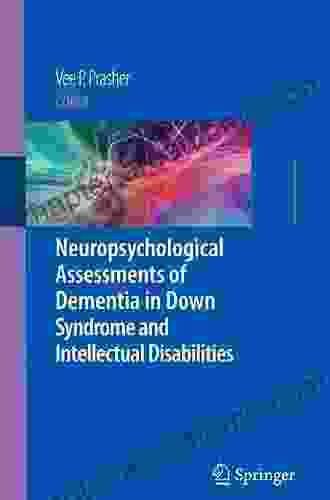Neuropsychological Assessments of Dementia in Down Syndrome and Intellectual Disability: A Comprehensive Guide

Dementia, a progressive cognitive decline, has emerged as a growing concern among individuals with Down syndrome (DS) and intellectual disabilities (ID).
5 out of 5
| Language | : | English |
| File size | : | 4423 KB |
| Text-to-Speech | : | Enabled |
| Screen Reader | : | Supported |
| Enhanced typesetting | : | Enabled |
| Print length | : | 574 pages |
As the population of individuals with DS ages, the prevalence of dementia is projected to increase, highlighting the urgent need for accurate and timely assessment methods. Neuropsychological assessments play a crucial role in identifying and characterizing dementia in this population, guiding treatment decisions, and supporting personalized care plans.
Unique Challenges in Assessing Dementia in DS and ID
Assessing dementia in individuals with DS and ID presents unique challenges:
- Co-occurring Cognitive Impairments: Individuals with DS and ID typically exhibit cognitive impairments, which can overlap with the symptoms of dementia.
- Communication Difficulties: Language and communication challenges can hinder the accurate assessment of cognitive abilities.
- Behavioral Issues: Behavioral problems, such as aggression or withdrawal, can interfere with assessment procedures.
- Cultural Factors: Cultural and socioeconomic factors can influence the presentation and expression of dementia symptoms.
Neuropsychological Assessment Tools
A comprehensive neuropsychological assessment battery typically includes the following tools:
- Cognitive Screening Measures: Brief, standardized tests that provide an initial indication of cognitive impairment, such as the Montreal Cognitive Assessment (MoCA) or the Mini-Mental State Examination (MMSE).
- Domain-Specific Assessments: Detailed tests that evaluate specific cognitive domains, such as memory (e.g., Wechsler Memory Scale),attention (e.g., Continuous Performance Test),and executive function (e.g., Trail Making Test).
- Behavioral Observations: Direct observations of the individual's behavior during the assessment can provide valuable information about social skills, language abilities, and emotional regulation.
- Neuroimaging Techniques: Brain imaging studies, such as magnetic resonance imaging (MRI) or computed tomography (CT),can provide insights into structural and functional abnormalities associated with dementia.
Differential Diagnosis
Accurate diagnosis of dementia in DS and ID requires a differential diagnosis to rule out other conditions that may mimic its symptoms, such as:
- Mild Cognitive Impairment (MCI): A transitional stage between normal aging and dementia, characterized by subtle cognitive decline that does not significantly interfere with daily functioning.
- Neurodegenerative DisFree Downloads: Conditions such as Alzheimer's disease, frontotemporal dementia, and Parkinson's disease can cause cognitive decline and behavioral changes.
- Psychiatric DisFree Downloads: Depression, anxiety, and other mental health conditions can present with symptoms that overlap with dementia.
- Medical Conditions: Thyroid disFree Downloads, vitamin deficiencies, and infections can cause cognitive impairment that may resemble dementia.
Clinical Features and Patterns of Cognitive Decline
The clinical presentation of dementia in DS and ID varies depending on the underlying cause and the individual's cognitive profile.
Commonly observed clinical features include:
- Progressive decline in memory, particularly episodic memory (memory for personal experiences).
- Difficulty with attention, concentration, and planning.
- Impaired judgment and problem-solving abilities.
- Language difficulties, such as decreased vocabulary and difficulty with comprehension.
- Behavioral changes, such as apathy, agitation, or disinhibition.
Patterns of cognitive decline in dementia can differ from those observed in typical aging populations:
- Early Onset: Dementia may develop at a younger age in individuals with DS, often in their 40s or 50s.
- Accelerated Progression: The rate of cognitive decline may be more rapid in DS compared to other populations.
- Varied Trajectories: The trajectory of cognitive decline can vary greatly, with some individuals exhibiting a step-wise decline while others experience a more gradual progression.
Management and Support
There is currently no cure for dementia, but early detection and intervention can help to manage symptoms, slow progression, and improve quality of life.
Management strategies include:
- Pharmacological Interventions: Medications, such as cholinesterase inhibitors, may help to improve cognitive function and reduce behavioral symptoms.
- Non-Pharmacological Interventions: Cognitive stimulation therapy, reminiscence therapy, and physical activity can help to maintain cognitive skills and promote well-being.
- Environmental Modifications: Adapting the environment to meet the individual's needs, such as providing visual cues and minimizing distractions, can reduce stress and enhance daily functioning.
- Caregiver Support: Providing education, resources, and respite care to caregivers can help them to cope with the challenges of caring for an individual with dementia.
Neuropsychological assessments play a vital role in the diagnosis and management of dementia in individuals with DS and ID.
By understanding the unique challenges and clinical features of dementia in this population, healthcare professionals can develop personalized care plans that address the individual's cognitive, behavioral, and emotional needs.
Ongoing research and advancements in neuroimaging and assessment techniques hold promise for further refining diagnostic accuracy and improving outcomes for individuals with dementia in DS and ID.
5 out of 5
| Language | : | English |
| File size | : | 4423 KB |
| Text-to-Speech | : | Enabled |
| Screen Reader | : | Supported |
| Enhanced typesetting | : | Enabled |
| Print length | : | 574 pages |
Do you want to contribute by writing guest posts on this blog?
Please contact us and send us a resume of previous articles that you have written.
 Book
Book Novel
Novel Page
Page Chapter
Chapter Text
Text Story
Story Genre
Genre Reader
Reader Library
Library Paperback
Paperback E-book
E-book Magazine
Magazine Newspaper
Newspaper Paragraph
Paragraph Sentence
Sentence Bookmark
Bookmark Shelf
Shelf Glossary
Glossary Bibliography
Bibliography Foreword
Foreword Preface
Preface Synopsis
Synopsis Annotation
Annotation Footnote
Footnote Manuscript
Manuscript Scroll
Scroll Codex
Codex Tome
Tome Bestseller
Bestseller Classics
Classics Library card
Library card Narrative
Narrative Biography
Biography Autobiography
Autobiography Memoir
Memoir Reference
Reference Encyclopedia
Encyclopedia Shawn Blaschka
Shawn Blaschka Mohankumar Saraswatipura
Mohankumar Saraswatipura Nick O Brien
Nick O Brien Michael Strassfeld
Michael Strassfeld Neil A Wynn
Neil A Wynn Richard Hood
Richard Hood Xavier Amador
Xavier Amador Nick Fancher
Nick Fancher Nathan D Grawe
Nathan D Grawe Richard Koszarski
Richard Koszarski Nancy Wiley
Nancy Wiley Ali Reza Panahian
Ali Reza Panahian Michael Kodas
Michael Kodas Thomas Kirschner
Thomas Kirschner Michael Sinclair
Michael Sinclair S Roystone Neverson
S Roystone Neverson Natalie Silverman
Natalie Silverman Violeta Chavez
Violeta Chavez Michelle Black
Michelle Black Peter Oldham
Peter Oldham
Light bulbAdvertise smarter! Our strategic ad space ensures maximum exposure. Reserve your spot today!

 Thomas MannThe Biggest Mistakes Homeowners Make When Choosing Flooring And How To Avoid...
Thomas MannThe Biggest Mistakes Homeowners Make When Choosing Flooring And How To Avoid...
 Peter CarterDive into the Object-Oriented Paradigm: A Comprehensive Guide with An Object...
Peter CarterDive into the Object-Oriented Paradigm: A Comprehensive Guide with An Object...
 Ismael HayesUnveiling the Enigmatic Secrets of Freemasonry: A Comprehensive Exploration...
Ismael HayesUnveiling the Enigmatic Secrets of Freemasonry: A Comprehensive Exploration...
 John ParkerUnveiling the Extraordinary Journey of Syud Hossain: A Literary Masterpiece...
John ParkerUnveiling the Extraordinary Journey of Syud Hossain: A Literary Masterpiece... Damon HayesFollow ·17.1k
Damon HayesFollow ·17.1k Mario SimmonsFollow ·19.7k
Mario SimmonsFollow ·19.7k Stan WardFollow ·12.8k
Stan WardFollow ·12.8k Ian McEwanFollow ·17k
Ian McEwanFollow ·17k Joseph FosterFollow ·5.2k
Joseph FosterFollow ·5.2k José MartíFollow ·18.6k
José MartíFollow ·18.6k John GreenFollow ·9.4k
John GreenFollow ·9.4k Osamu DazaiFollow ·15.8k
Osamu DazaiFollow ·15.8k

 Samuel Beckett
Samuel BeckettPortrait of the Plague Doctor: A Chilling Tale of Fear...
Prologue: A...

 Elliott Carter
Elliott CarterTrends in Modeling and Simulation Studies in...
Unveiling the Convergence of...

 Natsume Sōseki
Natsume SōsekiCells For Kids: Science For Children
Unlock the Microscopic...

 Anthony Wells
Anthony WellsUnlock the Power of Understanding: Embrace the African...
Embark on a Journey of Truth,...

 Forrest Reed
Forrest ReedBreaking Free: Healing from Toxic Relationships Between...
Are you struggling...
5 out of 5
| Language | : | English |
| File size | : | 4423 KB |
| Text-to-Speech | : | Enabled |
| Screen Reader | : | Supported |
| Enhanced typesetting | : | Enabled |
| Print length | : | 574 pages |






